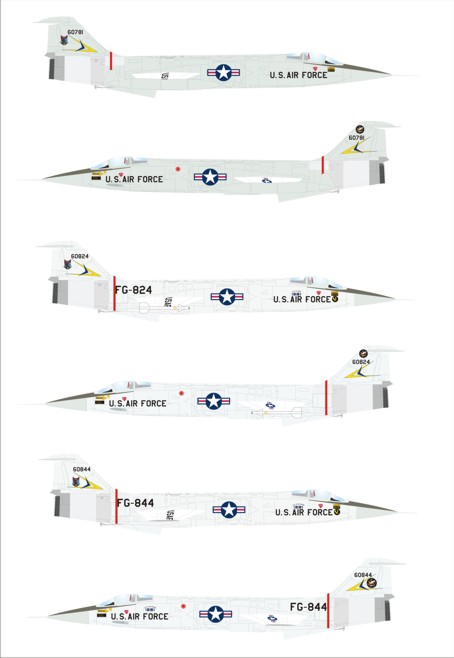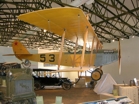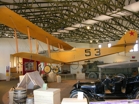

|
 |
 |
55-2925, an F-100D of the 118th TFS, CT-ANG, MASDC in October, 1979. Can you make out the shape of a bird in the tan paint?
F-102A
56-1008 that had served with the same unit several years
earlier. Both aircraft have a bird shape on the tail.
 |
 |
 |
 |
(Left and center) TAC-1, an F-15B (73-0108) serving with the 58th TTW in September 1979. The aircraft was still painted in the obsolete "Air Superiority Blue". After retirement the airframe was placed on display at Luke AFB and in August of 2004 the aircraft was repainted in the "Air Superiority Blue" scheme.
(Right)
71-0282 and 73-0113, both early F-15As in storage at MASDC
in 1978, also in Air Superiority Blue.
NASA
has used two Super Guppies for support of various space
programs. The first (N940NS) was modified from one of
two XC-97Js, serial 52-2693. Additional parts came
from two B377 Stratocruisers. The XC-97J was powered
by Allison T-34P7 turboprops, where as earlier Guppies had
been powered by the original R-4360s of the B377/C-97
family. When conversion was completed by Aero
Spacelines the aircraft was certified as a "B377SG".
Aeros Spacelines operated the Super Guppy from 1966 until
NASA bought it in the late 1970s and registered it as
N940NS. The Super Guppy was retired to AMARC in 1991
and is now displayed at the Pima Air & Space Museum in
Tucson, Arizona. From supporting the Gemini and Apollo
programs to various other NASA programs, the first Super
Guppy has hauled almost every type of cargo
imaginable. Nasa originally based the Super Guppy at
Ellington AFB, but moved the airplane to the El Paso
International Airport in the late 1980s to reduce corrosion.
The
second NASA Super Guppy is N941NA is also converted from
various Stratocruiser parts. It was originally built
by Aero Spacelines for Airbus Industries and designated as a
B377SGT-201. This Super Guppy stayed with Airbus from
1980 until 1997 when NASA purchased it to fill the void left
when N940 was retired. This is one of four "Super
Guppy Turbine" aircraft, the name denoting aircraft powered
by the Allison T-56 turbo prop engine. Like the first
NASA Super Guppy, this one also was originally based at
Ellington and also relocated to El Paso in 2006.
 |
 |
 |
 |
N940 is shown
transiting ELP in 1979 in the first two photos. The
third photo shows her taking off in 1991.
Of interest is that the main gears break
ground before the nose gear does.
The final photo shows N940 on display at
Pima in June, 2007.
 |
 |
 |
The
first and second photos show N941 shortly after arrival at
ELP in November, 2006.
About once a month N941 will be flown for
proficiency if there are not missions scheduled. This
is N941 on one of those flights in January, 2007.
Sitting with the flaps partly down N941
receives maintenance on a hot July day in 2007.
 |
A rather unique Thud on display at Lackland AFB in May,
1980. JF-105B 54-105 which was ordered as an
RF-105B. When the USAF chose the RF-101 as its new
recon airplane the three RF-105Bs were finished
as JF-105Bs. Though they had special recce noses
cameras were never carried and the three aircraft were used
for test and evaluation. This aircraft has since been
repainted in a more accurate finish.
 |
 |
(Left and center) The MS Tjisadane, the Dutch motor ship my father shipped out on to the South Pacific during WWII. This vessel had a very active career as an army transport in WWII and after, but was finally scrapped in 1962.
(Right) The Tjisadane
in post war service.
I am not
sure of the identity of this ship, but I believe it to be
the SS Santa Rosa, of the Grace Line while
operating as a troopship during WWII. If anyone has
any confirmation of this please email me.
Remember when
even tanks had some color? 3rd ACR M60A1 at Biggs Army
Airfield in 1973.
 |
 |
 |
N1K1 Kyofu also
on display at the museum. The Kyofu was given
the code name of "Rex" by allied air forces in WWII.
A poor quality photo
of N96264, P2V-5F (P-2E) Bureau Number 128346 at
Alamogordo-White Sands Regional Airport in 1976, or 77. The
B-17s flown by Black Hills Aviation were in the process of
being replaced by P-2s at the time. N96264 is still
flying today (March, 2006) with Neptune Aviation.
 |
 |
 |
The little
town of Columbus, New Mexico was the site of an armed raid by
Pancho Villa in March, 1916. At that time the U.S. Army
had a detachment of cavalry troops at Camp Furlong just to the
south of Columbus. That area is now the Pancho Villa
State Park. Located inside the park is a museum covering
the time period of the raid and the subsequent Pershing
Punitive Expedition into Mexico in pursuit of Villa.
Among some of the other exhibits is this replica of a Curtiss
JN-3 "Jenny". May, 2006 (CB)
 |
Along the lines of "Now
for something completely different!"
 |
 |
How about a
mastodon shaped mount?
Page
modified 03-18-21
Clifford Bossie